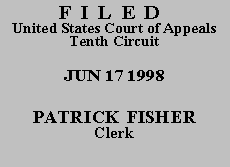

| UNITED STATES OF AMERICA,
Plaintiff-Appellee, v. STEVEN A. FORSYTHE, Defendant-Appellant. |
|
Defendant seeks the issuance of a certificate of appealability, see 28 U.S.C. § 2253(c)(1)(B), that would enable him to appeal the district court's denial of his 28 U.S.C. § 2255 motion for relief from his drug trafficking conviction. See United States v. Forsythe, 985 F. Supp. 1047 (D.Kan 1997). Because defendant failed to make a substantial showing of the denial of a constitutional right, we deny his application and dismiss this appeal. See 28 U.S.C. § 2253(c)(2).
Defendant asserts two arguments. First, he argues that his attorney was ineffective for failing to file a direct appeal. See Baker v. Kaiser, 929 F.2d 1495, 1499 (10th Cir. 1991) (constitutionally effective counsel must file direct criminal appeal if defendant requests). The district court, however, following an evidentiary hearing, found that defendant had in fact not requested that his attorney pursue a direct appeal. There is no indication that this factual finding is clearly erroneous. See United States v. Alvarez, 137 F.3d 1249, 1250-51 (10th Cir. 1998) (reviewing district court's factual findings, made in § 2255 proceeding, for clear error); see also United States v. Chavez, 862 F.2d 1436, 1438 (10th Cir. 1988) (factual findings based upon credibility of witnesses are special province of district court).
Secondly, defendant argues that the government breached the plea agreement by failing to make a motion for a reduction in his sentence, pursuant to U.S.S.G. § 5K1.1, in light of his cooperation. The plea agreement provided that, at the "sole discretion of the United States Attorney's Office," the government would file such a motion "in the event that defendant provides substantial assistance." Appellant's Br., App. 1 at 2-3. The government declined to file a § 5K1.1 motion because state authorities arrested defendant for drug trafficking activities, following his guilty plea but before sentencing on the federal conviction. See United States v. Lee, 989 F.2d 377, 380 (10th Cir. 1993) (when defendant asserts that government breached plea agreement by failing to file § 5K1.1 motion left to government's discretion, appellate court's role is limited to determining whether government made decision in good faith).
Because defendant did not file a direct appeal, he is procedurally barred from raising this claim absent a showing of cause and prejudice. See United States v. Kunzman, 125 F.3d 1363, 1365 (10th Cir. 1997), cert. denied, 118 S. Ct. 1375 (1998). Constitutionally ineffective assistance of counsel would provide the requisite cause. See, e.g., United States v. Lopez, 100 F.3d 113, 117 (10th Cir. 1996). Nonetheless, counsel was not ineffective in this case for failing to advise defendant to pursue this claim on direct appeal. See generally Romero v. Tansy, 46 F.3d 1024, 1031 (10th Cir. 1995) (describing defense counsel's constitutionally required duty to advise criminal defendant regarding merit of direct appeal).
The plea agreement left the decision to file a § 5K1.1 motion to the government's "sole discretion." In addition, another provision of the plea agreement specifically conditioned the government's promise to recommend a three-level downward departure for the acceptance of responsibility upon defendant's not engaging in additional criminal activity. Reading the plea agreement as a whole further supports the government's decision, made in good faith, not to file a § 5K1.1 motion. Counsel, therefore, was not ineffective for failing to advise defendant to assert this claim on direct appeal.
Defendant's application for the issuance of a certificate of appealability is, therefore, DENIED, and this appeal is DISMISSED.
Entered for the Court
Circuit Judge
*. This order and judgment is not binding precedent, except under the doctrines of law of the case, res judicata, and collateral estoppel. The court generally disfavors the citation of orders and judgments; nevertheless, an order and judgment may be cited under the terms and conditions of 10th Cir. R. 36.3.